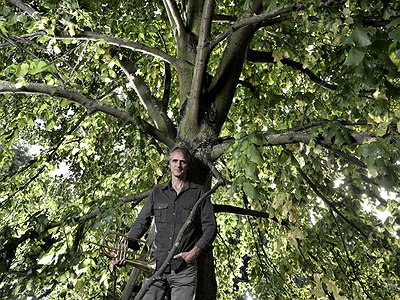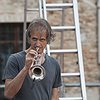Name: Markus Stockhausen
Nationality: German
Occupation: Trumpeter / Composer / Improviser
Selected Bands/Projects: Aparis, Inside Out (duo with Florian Weber), Quadrivium, Moving Sounds (duo with Tara Bouman), duo Snétberger - Stockhausen
Selected Labels: Aktivraum, ECM, Enja records
Current Release: Atlas EP on Resiliens Recordings
Musical Recommendations: All early recordings by the indian bansuri player Hariprasad Chaurasia. And, because I speak about my father so often in this interview, please listen to some of his master works like "Inori", "Mantra", "Kontakte", "Hymnen", "Michaels Reise um die Erde", and many others.
Website / Contact: If you enjoyed this interview with Markus Stockhausen, you can find out more about him on his personal website.
When did you start composing - and what or who were your early passions and influences?
During my school years I was already writing my first little tunes for our jazz quintet KEY. But it’s only since 2001 that I started to compose larger works for orchestras and ensembles. My early passions were trumpet players like Freddie Hubbard (First Light), Miles Davis (In a silent way), Count Basie, Stan Kenton, later Keith Jarret, Kenny Wheeler, and the fantastic Indian flute player Hariprasad Chaurasia – all this besides Johann Sebastian Bach, Mozart, and of course the music of my father, which I absorbed naturally.
For most artists, originality is first preceded by a phase of learning and, often, emulating others. What was this like for you? How would you describe your own development as an artist and the transition towards your own voice?
When deciding where to study I realized that the European language in art, in music and especially in jazz was quite different from the US American styles. I preferred to stay in Germany and find my own sound and music, unlike others, who eagerly imitated the American jazz styles. Having the image of my father right in front of me I also learned at an early age to believe in myself and to go my own way. As a friend put it much later: “Don’t go with the flow, neither against it, but completely outside of it, just be yourself”. My jazz trumpet teacher Manfred Schoof and others were also good examples at the time for originality. It took me a while to find my own sound. It was a real struggle, and before you arrive at this you imitate others and try out many things. This is normal.
What were some of the most important creative challenges when starting out as a composer and how have they changed over time?
Composing for me always was and is a joy. Since I never studied composition I always had to figure out things myself, which I quite liked. With the help of the composing tool “Sibelius” I became my own teacher, because you can easily listen back to what you just composed, find mistakes, alter things and thus imagine exactly what the music will sound like. Without this precious tool I would have never composed large works. Nowadays I don’t award much time to composition. I am now in a period of concerts and seminars.
Tell us about your studio/work space, please. What were criteria when setting it up and how does this environment influence the creative process? How important, relatively speaking, are factors like mood, ergonomics, haptics and technology for you?
I am not a technical guy. I operate with Apple computers, using Logic for recording and Sibelius for composing, I just know the basics. But that’s enough for me. Concentration, focus is all you need, and some good ideas. These usually come as soon as you sincerely dedicate yourself to the work intended. My studio also has a nice old Steinway piano, and serves as a meditation room sometimes. So the atmosphere is warm, not technical.
Could you take me through the process of composing on the basis of one of your pieces that's particularly dear to you, please? What do you start with when working on a new piece, for example, how do you form your creative decisions and how do you refine them?
My way of composing has always been intuitive. I may hear a melody inside of me, verify it at the piano, maybe harmonize it and immediately begin to compose. Out of a small cell even large works can evolve, like “Tanzendes Licht” (Dancing Light) for solo trumpet, big band and string orchestra. The work lasts more than 30 minutes and out of the first piano motive and the idea to compose everything in a 9/8 feel, everything else followed. Just like when I improvise on the trumpet and hear the next note inside of me, also in composition out of one situation evolves the next. In the case of “Tanzendes Licht”, which was commissioned by the Swiss jazz Orchestra, I also made a quick sketch about which instrumental groups should play with each other, which combinations I would like to hear and how many solo instruments there were. In about 4 weeks, the piece was finished.
What, if anything, do you personally draw from the cosmos of electronic music and digital production tools that is inspiring for your daily practise? In how far do you see the potential for a mutual creative pollination between the two?
This you should really ask my brother Simon, who currently dedicates himself full time to sound creation. He is just amazing ! (see also www.patchpool.de/) Myself I use electronics mostly in certain concerts – or recordings like the one with Maurizio Martusciello, alias Martux_m (ATLAS EP) -, using effects that I have liked since the seventies, like delays and harmonizing the trumpet, playing a midi keyboard with my left hand, pressing the chords for each note or melody, while with the right hand I play the trumpet. I use a stand alone program derived from Max MSP which a friend programmed for me.
How do you see the relationship between timbre and composition?
Timbre is my daily struggle, to find the right sound on my horns. I am addicted to this constant search. The same applies to electronics. My search for the right sound is then extended into the electronics. In relation to composition? A special sound might inspire me for a piece. As I said, I work intuitively mostly …
Time is a variable only seldomly discussed within the context of contemporary composition. Can you tell me a bit about your perspective on time in relation to a composition and what role it plays in your work?
Maybe you over estimate my intellectual approach to composition. I am not like my father. He could probably have written a book on your question. And if you search a bit, he has given very valid and explicit answers on this. For me each composition is an organism of its own, it has to feel complete, round, natural. I like long developments and longer forms, maybe because I got used to them through my father’s sometimes very long works. See my CD Electric Treasures – 2 x 45 minutes from a live concert, each set without interruption.
What do improvisation and composition mean to you and what, to you, are their respective merits?
In short: they complement each other. Since 2001 I have combined composition and improvisation in almost all my composed works. Listen to my new album ALBA on ECM, which has just come out. It is a good example of how composition and improvisation are interwoven. The compositions give the frame, and the moment’s inspiration opens it up, transcends it, sometimes in very unexpected ways - like last night in a concert together with Florian Weber in Budapest. We played things in a completely new way – maybe because Peter Eötvös and György Kurtag were listening, what an honour and joy …
Do you feel it important that an audience is able to deduct the processes and ideas behind a work purely on the basis of the music? If so, how do you make them transparent?
Another question for my father … he spent a great deal of his time analysing his works for his students, for the “Musikwissenschaftler” (musicologists) and his audience. His thoughts, calculations and architecture behind each work were amazing, an art in itself. For my music I am satisfied when the music speaks to the listener, when it reaches his or her heart. That’s really important for me. Some people just listen and feel, others start to analyse … but no one so far has come to me and asked to analyse one of my scores. Whereas in the case of my father the whole music world looked at his new works, especially in the early days, in Darmstadt at the famous Ferienkurse (summer courses), or later in Kürten, where he lived and taught every summer.



